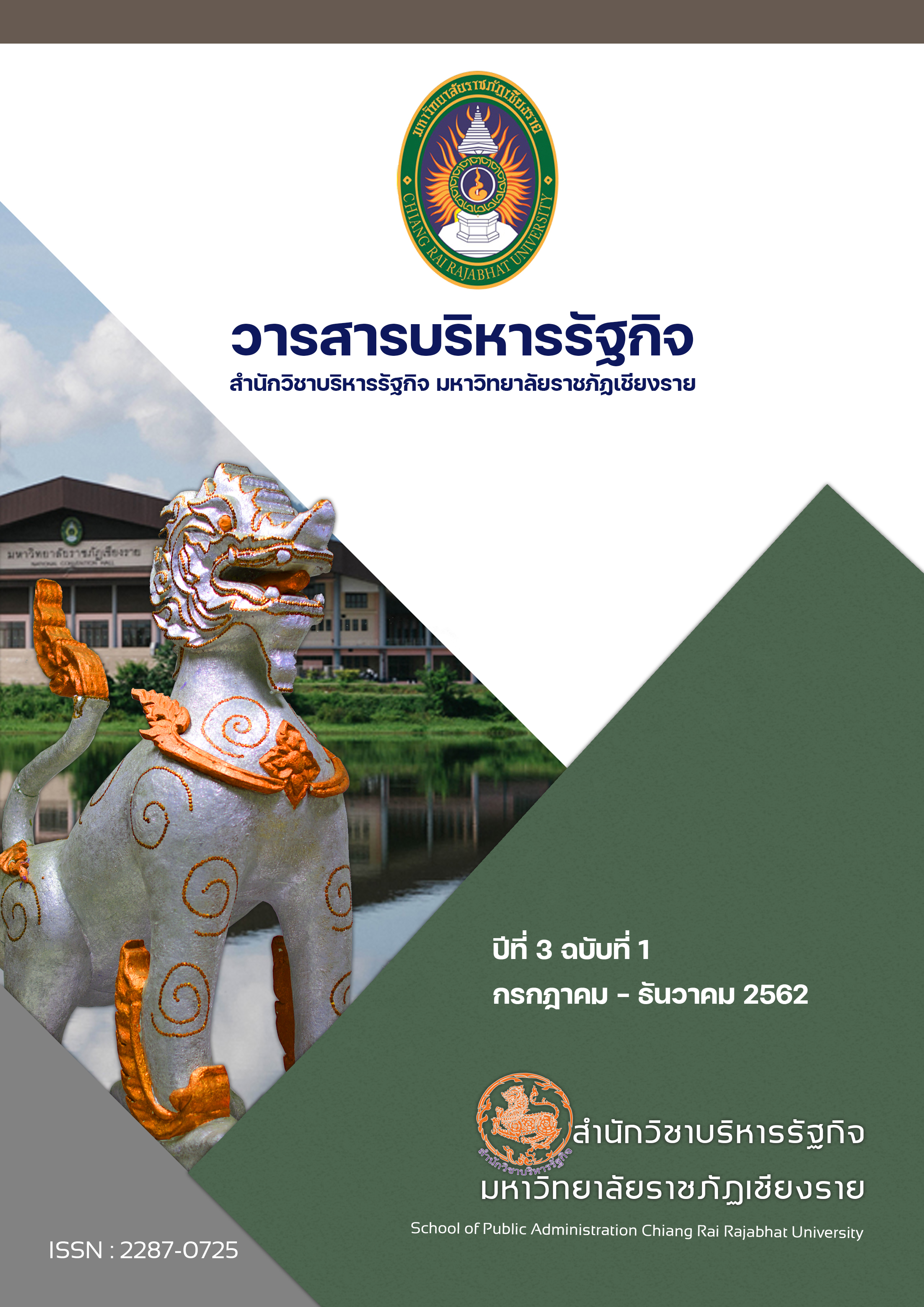โครงการประชารัฐ: นโยบายเชิงประชานิยมภายใต้รัฐธรรมนูญฉบับใหม่กับการสืบทอดอำนาจของคณะรักษาความสงบแห่งชาติ (คสช.)
Main Article Content
บทคัดย่อ
“โครงการประชารัฐ” เป็นการดำเนินนโยบายของรัฐบาลคณะรักษาความสงบแห่งชาติ (คสช.) ตั้งแต่ปี พ.ศ. 2557-2562 และยังมีการสานต่อนโยบายดังกล่าวผ่านการสืบทอดอำนาจตามกระบวนการเลือกตั้งในปี พ.ศ. 2562 ภายใต้ “พรรคการเมืองนอมินี” ในนาม “พรรคพลังประชารัฐ” และได้เป็นแกนนำจัดตั้งรัฐบาล โดยการดำเนินนโยบายต่าง ๆ เป็นการเปลี่ยนชื่อ “นโยบายประชานิยม” ที่ประสบความสำเร็จในอดีต เพื่อให้เอื้อต่อการสร้างฐานความนิยมทางการเมืองของตนและมุ่งตอบสนองต่อความต้องการขั้นพื้นฐานของประชาชนอย่างต่อเนื่อง แม้ว่าชนชั้นกลางหรือกลุ่มนายทุนจะมีการโจมตี “นโยบายประชานิยม” ในประเด็นเรื่องของความสิ้นเปลืองในทางเศรษฐศาสตร์ แต่ก็ไม่อาจทำให้การออกนโยบายต่าง ๆ ของรัฐบาลหลุดพ้นจากแนวทางดังกล่าวไปได้ อันมีสาเหตุหลักมาจากการมุ่งเอาใจกลุ่มฐานเสียงส่วนใหญ่ที่อยู่ในสังคม ซึ่งก็คือ “กลุ่มชนชั้นรากหญ้า” ด้วยเหตุนี้ รัฐบาลใหม่ที่มาจากการสืบทอดอำนาจทางการเมืองผ่านกระบวนการเลือกตั้ง ในปี พ.ศ. 2562 จึงต้องดำเนินนโยบายที่มุ่งเน้นฐานความนิยมและฐานเสียงการสนับสนุนจากประชาชน เพื่อให้ได้รับการเลือกตั้งมากกว่าที่จะมุ่งเน้นฐานนโยบายของพรรคการเมือง ซึ่งนำเสนอในประเด็นการสร้างระบบเศรษฐกิจแบบยั่งยืนภายใต้ “แนวทางรัฐสวัสดิการ” ที่มุ่งเน้นการจัดเก็บภาษีและตอบแทนประชาชนผู้เสียภาษีผ่านสวัสดิการสังคมอย่างมีคุณภาพ
“โครงการประชารัฐ” เป็นการดำเนินนโยบายของรัฐบาลคณะรักษาความสงบแห่งชาติ (คสช.) ตั้งแต่ปี พ.ศ. 2557-2562 และยังมีการสานต่อนโยบายดังกล่าวผ่านการสืบทอดอำนาจตามกระบวนการเลือกตั้งในปี พ.ศ. 2562 ภายใต้ “พรรคการเมืองนอมินี” ในนาม “พรรคพลังประชารัฐ” และได้เป็นแกนนำจัดตั้งรัฐบาล โดยการดำเนินนโยบายต่าง ๆ เป็นการเปลี่ยนชื่อ “นโยบายประชานิยม” ที่ประสบความสำเร็จในอดีต เพื่อให้เอื้อต่อการสร้างฐานความนิยมทางการเมืองของตนและมุ่งตอบสนองต่อความต้องการขั้นพื้นฐานของประชาชนอย่างต่อเนื่อง แม้ว่าชนชั้นกลางหรือกลุ่มนายทุนจะมีการโจมตี “นโยบายประชานิยม” ในประเด็นเรื่องของความสิ้นเปลืองในทางเศรษฐศาสตร์ แต่ก็ไม่อาจทำให้การออกนโยบายต่างๆ ของรัฐบาลหลุดพ้นจากแนวทางดังกล่าวไปได้ อันมีสาเหตุหลักมาจากการมุ่งเอาใจกลุ่มฐานเสียงส่วนใหญ่ที่อยู่ในสังคม ซึ่งก็คือ “กลุ่มชนชั้นรากหญ้า” ด้วยเหตุนี้ รัฐบาลใหม่ที่มาจากการสืบทอดอำนาจทางการเมืองผ่านกระบวนการเลือกตั้ง ในปี พ.ศ. 2562 จึงต้องดำเนินนโยบายที่มุ่งเน้นฐานความนิยมและฐานเสียงการสนับสนุนจากประชาชน เพื่อให้ได้รับการเลือกตั้งมากกว่าที่จะมุ่งเน้นฐานนโยบายของพรรคการเมือง ซึ่งนำเสนอในประเด็นการสร้างระบบเศรษฐกิจแบบยั่งยืนภายใต้ “แนวทางรัฐสวัสดิการ” ที่มุ่งเน้นการจัดเก็บภาษีและตอบแทนประชาชนผู้เสียภาษีผ่านสวัสดิการสังคมอย่างมีคุณภาพและฐานความนิยมทางการเมือง 2) การสร้างกลไกการสืบทอดอำนาจผ่านรัฐธรรมนูญโดยการยึดโยงนโยบายเชิงประชานิยมผนวกเข้ากับแผนยุทธศาสตร์ชาติ 20 ปี 3) การสานต่อนโยบายประชารัฐเดิมของรัฐบาลคณะรักษาความสงบแห่งชาติ (คสช.) 4) การแสดงรูปแบบอัตลักษณ์เชิงนโยบายอย่างเป็นรูปธรรม 5) การบ่งชี้อุดมการณ์ให้สอดคล้องกับบริบทของการแข่งขันทางการเมือง
Article Details
เอกสารอ้างอิง
Chaisaard, W. (2017). The Impact of Vending Machine on the bus to Thai people. Retrieved June 26, 2019 from https://www.posttoday.com/politic/report/530566
Chantorapidok, A. (2019). The Illusion of the Finance:The Analysis of the Effect of thePopularism Policy implementation. Silpakorn University Journal, 39(1), 1-17.
Chutipat, W. (2011). Greece, The Priority for Victory is first without uninterested ofthe damaged country. Retrieved July 8, 2019 from http://www.doctorwe.com/posttoday/20110707
Insrisawang, C. (2016). The Government’s New Year Gift which staking for rising Thailand’s economy. Retrieved June 26, 2019 from https://www.posttoday.com/politic/report/470837
Itsarachai, Y. (2018). The Wealthy Government give bonus to the poor and cause tochaotic. Retrieved June 26, 2019 from https://mgronline.com/live/detail/9610000122634 26/6/62
Jitsuchon, S. (2014). The Inequality in Thailand Society: The Policy Trends and the Path to use the Policy. Retrieved July 26, 2019 from https://tdri.or.th/wp-content/uploads/2017/06/Synthesis-Report-Year-2-Inclusive-Growth.pdf
Kachanan, R. (2015). The Analyzing of the different from the Civil State and the Popularism. Retrieved June 26, 2019 from http://dl.parliament.go.th/bitstream/handle/lirt/520919/hi2558-098.pdf?sequence=1
Ktcore. (2018). “Card for Poor” The Policy of Civil Welfare 4.0 Success or Fail ?. Retrieved June 25, 2019 from https://www.ktcore.com/2018/602/
Laothammatad, A. (2006). Taksina-Popularism. Bangkok: Matichon Publishing House.
Lingle, C. (2002). The Perils of Populism. [Online]. Retrieved June 15, 2017 from https://admin.fee.org/files/doclib/lingle0502.pdf
Office of the National Economic and Social Development Council. (2017). (Draft) National Strategy in 20 Years Term (2017-2036). Retrieved July 21, 2019 fromhttps://www.nesdb.go.th/download/document/ร่างยุทธศาสตร์ชาติ%20ระยะ%2020%20ปี%20(พ.ศ2560%20-%202579).pdf
_______. (2017). National Strategy in 20 Years Term 2018-2037 (Brief). Retrieved July 21,2019 from https://www.nesdb.go.th/download/document/SAC/NS_SumPlanOct2018.pdf
Palang Pracharath Party. (2019). Civil welfare. Retrieved July 21, 2019 from https://pprp.or.th/สวัสดิการประชารัฐ/_______. (2019). Civil Society. Retrieved July 21, 2019 from https://pprp.or.th/สังคมประชารัฐ/
_______. (2019). Civil State Economy. Retrieved July 21, 2019 from https://pprp.or.th/เศรษฐกิจประชารัฐ/Parliament. (2017). The Constitution of the Kingdom of Thailand 2017. Bangkok:Parliament.
Piphatsereetham, N. (2012). The Factor that Cause Populism in Thailand Democracy. Thammasat Economic Journal, 26(3).
_______. (2017). The Constitution of the Kingdom of Thailand 2017. Retrieved July 28,2019 from http://www.ratchakitcha.soc.go.th/DATA/PDF/2560/A/040/1.PDF
Promphap, S. & Wongsurarat, K. (2015). Popularism of Thailand Democracy D.C. 2010 - 2014. Journal of Political Science and Law Kalasin Rajabhat University, 4(2), 232-249.
Saengsuwan, A. (2010). The Inequality. Bangkok: Sasin Graduate Institute of Business ofAdministration of Chulalongkorn University. Retrieved July 14, 2019 from https://library2.parliament.go.th/ebook/content-issue/2558/hi2558-052.pdf
Sangkaew, T. & Pankaew, A. (2016). Roadmap of Democracy. Retrieved June 26, 2019from wiki.kpi.ac.th/index.php?title=Road_Map_ประชาธิปไตย
Storylog. (2016). The lesson from Argentina. Retrieved June 25, 2019 from https://storylog.co/story/5731de4927d3f4562310cdf3 3/7/62
Tansakul, S. & Team. (n.d). Thailand Future Foundation: The Study’s Series of the 8 Facts from the Inequality in Thailand Society. Retrieved July 26, 2019 fromhttps://thaipublica.org/wp-content/uploads/2014/04/8-ข้อเท็จจริงความเหลื่อมล้ำในไทย_full_report.pdf
Thamjai, A. (2018). Civil State, Popularism, and Welfare State. Retrieved July 13, 2019 from https://www.bangkokbiznews.com/blog/detail/635795
Voicetv. (2019). 14.5 Million of the Civil Welfare Cardholder had spend around3,800 million BAHT in January. Retrieved June 25, 2019 from https://voicetv.co.th/read/xSgkOLbs2
Waitayangkoon, C. (2017). Inequality in Society from Government Policy (End). Retrieved July 14, 2019 from https://www.bangkokbiznews.com/blog/detail/641826
Wangkittikul, P. (2011). The Impact of Taksin’s Populism Policy to Politic of Thailand Democracy. Master’s Thesis, Bangkok: Chulalongkorn University. Retrieved July21, 2019 from http://cuir.car.chula.ac.th/dspace/bitstream/123456789/60016/1/5781044024.pdf
Wongkrasan, N. (2011). Greece. The Study Case of Debt Crisis and Populism which Impactto Human ecology. Retrieved July 8, 2019 from http://popularity49.blogspot.com/2011/12/blog-post_22.html
Workpoint News. (2018). Repeating, the right to use free electronicity of Civil Welfare Card must use less than 230 BAHT. Retrieved July 20, 2019 from https://workpointnews.com/2018/12/14/ย้ำสิทธิ์ค่าไฟฟรี-บัตร/


